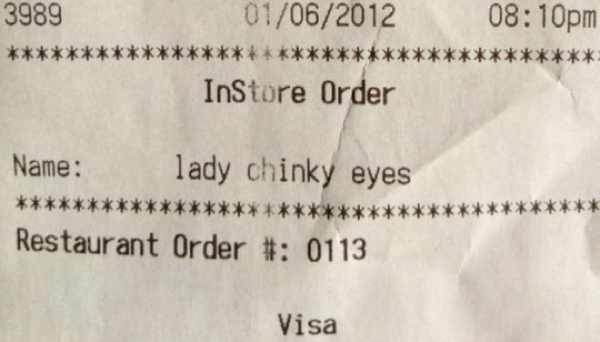
Minhee Cho made headlines after ordering pizza from Papa John’s and had her name misspelled as “Lady Chinky Eyes”. While I’m sure American Law gives the benefit of the doubt to the employee to defend herself as a mentally challenged and defective wart who ingested too much over-due pizza and had a cerebrovascular accident, myocardial infarction and carotid stenosis when typing it in, I’m more inclined to think it was somewhat slightly malicious in nature (in addition to the above). Papa John’s pizza has issued an apology on Twitter and fired the employee responsible so kudos to them.
Surprisingly however, I’m not 100% offended (okay, if it happened to me I might actually go back and knock the crust outta the person) but having “Lady Chinky Eyes” put on a receipt as the customers name at a pizza store made me laugh. I did think though, just how did the term chink/y become “racist”? I decided to do some digging into the history of the word, and was rather surprised.
According to the Online Etymology Dictionary, Chink dates from 1901 although Wikipedia sources place it further at 1878 and 1890. The actual origins are debated as well, from being the sound made by Chinese coolies building the Pacific railroads to a reference of the slanted eyes we are so famed for. Whatever the origins for the word, it has become a well-known slur, similar to the famous, dare I say it (I dare not) N-word. Aside from the obvious connection of offensiveness that is connotative with the word and the primary use as a derogative for Asians, “Chink” has a side of non-racism to it from the early days of creation of use up to modern times. An interesting use of the word however has arisen in the United Kingdom, where “Chink” is sometimes not only racist but accepted as a slang for the local Chinese takeaway. A complaint made to the BBC in 2002 highlighted how it was not the use but the intent that was relevant in determining offensiveness. Debatable indeed.
Other incidents where “Chink” has been used “inoffensively” in public include the old Pekin (Illinois) High School teams that used the name, Pekin Chinks (allegedly complete with students dressed as a Chinaman and a gong which was struck with every goal). This post of a former “Chink” claims they interpreted it as meaning “worker”, and not a derogatory term. Funnily enough, it may have be possible that with the early origins of the word potentially grounded in the labour of the railway workers, it could have become commonly accepted without malice as meaning a Chinese worker. Another example of where allegedly it’s not in an offensive context was when comedian Sarah Silverman used it in her routine. In her view, it was legitimate as an expression of free speech and she has a Asian fanbase that supported her (oh yes, those dolls of you with pins stuck in them is our way of saying you’re painfully good). I gotta say, she’s one dumb comedian. She should take some tips on making racial or religious joke from Russell Peters, who’s smart enough to bash everyone including himself the most without going overboard. There are incidents however, where it’s openly offensive.
The New York Hot 97 radio station broadcasted a song in 2005 which was a parody of “We are the world” and named “USA for Indonesia“. The lyrics were racially offensive and poked fun at those affected by the 2004 Tsunami, and included the all-popular word, “Chink”. Whilst matters eventually proceeded with on-air spat with one DJ who was of Korean descent (Minya Oh aka Miss Info) and eventually culminated with several members fired (one was hired by another station, what the hell!), the fact is that it was broadcasted to try and compete for ratings with another radio station. Amazing, those idiots at Hot 97 should go back to primary school. I’m also rather angry that Miss Jones, the “shock jock” (I’d like to give her a shock alright, 20,000 volts up the *censored*) never actually issued an apology and was actually described “professional” by Jill Strada, Program Director for 98.7 KISS FM, the hiring station. Humph. (I want to clarify, information from the above paragraph came primarily from Wikipedia or likewise sources, those interested should conduct their own research before forming a conclusion).
So back to the issue at hand, the use of Chink, Chinky and likewise words. It is racist? more often than not, yes. About the only time it’s not racist is when it comes from someone of the same racial background right? Enter in Wang Leehom. His use of the word comes in the hope that it will be cool one day. I’ll think about moving to Mars when Chink enters the vocabulary as a cool word. Having things like “Let’s go chink man” and “Alright, we’re chinked dude” would involve me ending up in jail with charges of 1st degree murder. I’m surprised, it’s a gutsy move.
Thus I hear you cry out in confusion, is Chink and likewise words racist? My answer: yes, for the most part. While it can be slang for someone which doesn’t mean it to be offensive, the meaning and offensiveness is dictated by the audience, and while one day Wang Lee Hom might get his wish that it becomes “cool”, for the moment it’s about as polite as using the N-word in front of a African American. I suggest even if you’re Asian by ethnicity, the use of the word only perpetuates its longevity and this is one word we could do without.








